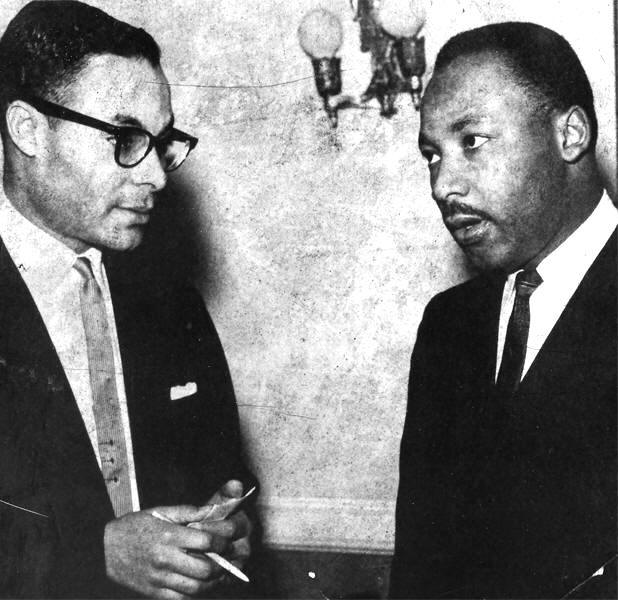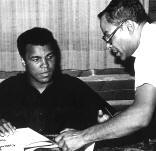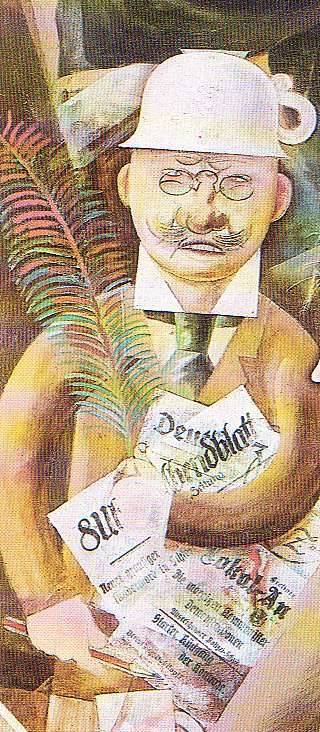
OCTOBER 2007
Obituary of Joseph Walker, Journalist, Civil Rights Advocate, Labor Advocate

Joseph Walker (73) , an award wining journalist and labor advocate, died August 14 in New York City after a short illness. A longtime resident of Harlem for over 40 years, Mr. Walker covered the African American people’s struggle and other progressive struggles around the world whether those other movements were nationalist, socialist, communist, anti-imperialist, or organized labor. In
1976 he received the Julius Fucik Honorary Medal from the International Organization of Journalists. The Medal was in recognition of his outstanding achievement in journalism in the fight against colonialism, racism and fascism, and for world peace and understanding.
Born in Buffalo New York on March 11, 1934 to the late Luther and Emma Walker, he graduated from Buffalo's East High School and then attended Champlain College in Plattsburgh NY (1952-1953) and Adelphi University in Garden City NY (1953-1955). In 1955 Walker joined the US Army and served honorably in Germany. In 1957 he returned to Buffalo and began his journalistic career, first as a reporter and then as the editor of the Buffalo "Empire Star", a
weekly black owned newspaper.
Using his pen to expose segregation and bias in Buffalo, he wrote many courageous and honest articles that brought him to the attention of Malcolm X and many supporters of civil rights. When financial difficulties forced the closure of the "Empire Star", Walker accepted a job in New York City as a reporter and correspondent for "Muhammad Speaks", the newspaper of the Nation
of Islam and, at that time, the largest Black Newspaper in the nation.
Initially Joe covered domestic events, such as the police assault on the Muslim mosque in Harlem, the Attica Prison assaults and the Angela Davis trial. Walker and his photographer, Joe Crawford, conducted the interviews and shot the photos that helped launched the international movement to defend Ms Davis. During these years, Joe Walker and Joe Crawford also assembled and produced
three anthologies of work of outstanding African-American photographers - The Black Photographers Annuals - which have become an outstanding record of the Black experience. Forewords and introductions to these annuals were written without pay by Gordon Parks, James Baldwin, Toni Morrison, and Clayton Riley.
Eventually Walker became the New York City Bureau Chief of "Muhammad Speaks" and it’s successor, "Bilalian News". He also became the United Nations Bureau Chief for "Muhammad Speaks" and covered events around the world. He traveled to over sixty countries and attended many conferences and other international gatherings. From his travels he wrote a series of featured
articles on the Middle East, North Korea, Cuba, the Vietnamese War, the Islamic areas of the Soviet Union and other critical hot spots of the 1960s and ‘70s.
John Woodford, the former editor-in-chief of "Muhammad Speaks", said. "Joe was a journalistic super-star of the progressive world. He covered events worldwide and was revered by freedom fighters, such as Nguyen Thi Madame Binh, a Vietnamese delegate to the Paris Peace Talks; Dolores Huerta of the United Farm Workers Union; the Afro-Russian journalists Slava Tynes and Lily Golden; the Cuban Diplomat Ricardo Alarcon; and leading figures in many of the
anti-imperialist African liberation movements, such as the ANC (African National Congress), FRELIMO (Front For The Liberation Of Mozambique), MPLA (Movement For The Popular Liberation Of Angola), ZAPU (Zimbabwe African People's Union), and SWAPO (Southwest African People's Organization)."
From his father, who was the president of the Buffalo branch of the Dining Car Employees Union, Joe Walker grasped an early understanding of the trade union struggle and extended his work to include trade unionism. In 1963 he began work in New York City for Local 1199, the Drug and Hospital Employees Union, AFL-CIO, where he was the Editor of Union Publications. Later he worked at Local 144, the Hotel, Hospital, Nursing Home and Allied Health Services Union,
where he was Editor of publications and director of public relations; and in Albany at the New York State Public Employees Federation (PEF) where he was a public relations specialist and editor of publications.
In 1996 Joe Walker also became a college instructor, teaching popular courses on the history of the Black Press at the City College of New York's Center For Worker Education. He also maintained his hand in journalism by writting articles for serveral black newspapers. His last job, from which he retired, was as an Account Developer for the Worker Opportunities Re-Employment Center (WORC).

During his life, Joe Walker enjoyed professional and personal relationships with a number of dignitaries, civil rights activists, and freedom fighters to include Martin Luther King, Jr., Muhammad Ali, Malcolm X, Angela Davis, Adam Clayton Powell Jr., James Baldwin, Hulan Jack, and David Dinkins, the former Mayor of NYC.
Survivors include his wife Isabel Castro Walker of Manhattan but is now in the Bronx Nursing Home; his step-son Joseph Cole of the Bronx; three grandchildren: Joseph Cole Jr. and Faith Cole of Queens and Tiana Cole of Florida; his brother Emmett Walker of Fort Washington MD; a niece, Lisa Walker of Columbia MD, a nephew, Emmett Walker Jr of Atlanta; and a host of loving colleagues and friends.
If not attacked by Israeli
soldiers,  journalists
are attacked by Palestinian security forces
journalists
are attacked by Palestinian security forces
Saturday September 01, 2007 15:00 by Ghassan Bannoura - IMEMC johnsmithimemc at gmail dot com
Palestinian journalists were this week attacked three times by Palestinian Authority forces in the Gaza strip. Similarly, security forces last week attacked journalists and media organizations in the West Bank. While Palestinian journalists have always had to deal with the brutality of the Israeli army, these new attacks set a dangerous new precedent in which journalists now have to be concerned over attacks from their own security forces.
The Palestinian constitution grantees
the freedom of press, and grants local and international
journalists the right to cover news freely across the
occupied Palestinian territories. Despite this, attacks
against those working in the news are on the increase,
and journalists are being used as pawns in a disturbing
political game in which the need to display power
seemingly over-rides any commitment to the freedom of the
press.
Such a situation gravely complicates an already trouble
environment. Palestinian journalists are now asking
themselves how they are best able to communicate with the
rest of the world when they are being forced to write
about two separate Palestinian governments, both of whom
are hostile to one another.
Abded Al Salam Shihada, a Palestinian journalist for the
Ramatan News Agency in Gaza, spoke with IMEMC of the
problems faced by those attempting to report the news in
a fair and unbiased manner, calling to both Fatah and
Hamas to respect the rights guaranteed to journalists
under the Palestinian constitution.
"Journalists have the right to access information,
to document and to write. The Palestinian people also
have the right to freedom of the press, and freedom of
expression, wither they are Fatah or Hamas. Political
groups have to accept and respect this.”
On Friday, approximately 11 people were injured by the
Hamas-affiliated Executive force as they held a protest
in Gaza City. Of the most shocking images from this
protest was the footage of officers savagely beating one
journalist as he lay prone on the ground.
IMEMC spoke to Dr. Khalil Abu Lilah, a Hamas leader in
the Gaza strip, of this attack. Abu Lilah stated “we
say that any Palestinian has the right to free
expression, that journalists have the right to be able to
work without restriction. Nevertheless, when the
protesters attacked public and private property, security
forces were forced to use force to stop them, and that is
what happened on Friday."
When asked why journalists were attacked, Dr. Abu Lilah
stated "everyone knows that, in the heat of the
moment, some misconduct can happen. I think this conduct
will be investigated, and those who were guilty of using
excessive force will be punished according to Palestinian
law.”
Despite the many attacks on journalists and civilians in
the West Bank and Gaza Strip, not one member of the
security forces has faced criminal charges. It would seem
that, so long as such a situation continues to exist,
Palestinian journalists must now be wary of not only the
brutality of the Israeli army, but of their own security
forces also.
A yiddishe revolution
in America's media
Some of the most Waspy papers in the US have just been
acquired by the most Jewish of publishers
NOT so long ago, the very idea of the Tribune Company,
owner of the Chicago Tribune, Newsday, Baltimore Sun and
the Los Angeles Times falling into Jewish ownership would
have looked preposterous. The New York Times and
Washington Post may glory in their Jewish antecedents.
But the Tribune, the creation of the Anglophobe colonel
Robert McCormick, an American-firster who thought the
Nazis were Europe's problem, not America's, was despised
in Jewish households.
The colonel loathed the wartime US President Franklin D.
Roosevelt, whom he viewed as being in cahoots with the
British and a traitor to his social class. In McCormick's
view, FDR was unsound because he was in thrall to the
Jews. Now, after a very public auction, the Tribune
Company has fallen into the hands of a very Jewish
entrepreneur, Sam Zell, described by the American Jewish
paper The Forward as a "billionaire boychik".
...
Zell and Geffen may not be traditional newspaper
proprietors, but both are overtly Jewish and pro-Israel.
They would bring a different perspective to the previous
American first-owning families, whose culture still
lingers on the fringes.
Zell insists he will leave journalism to those who know
about it. But newspaper proprietors always find it hard
to keep their hands out of the cookie jar.
Alex Brummer is City Editor of The Daily Mail
Brussels journalists unhappy with 'routine secrecy'
12.09.2007 - 17:43 CET
EUOBSERVER / BRUSSELS – Journalists in Brussels are
dissatisfied with the "routine secrecy" that
goes on in the EU institutions, an association of foreign
journalists said after an information request from the
group was only partially upheld by an EU court.On
Wednesday the Court of First Instance (CFI), partially
upheld an appeal by the Brussels-based Association de la
Press Internationale (API), ruling that the European
Commission in two out of four instances "committed
an error of assessment by refusing access" to
certain documents and that the decisions "must be
annulled".
In the third and fourth instance, the court held that the
refusal of access to documents was justified due to the
sensitive nature of the particular cases.
On 1 August 2003, API asked the commission for access to
all the written submissions made by the commission to the
CFI or the European Court of Justice in a number of
cases, such as legal actions between the EU executive and
different companies.However, a few months later, the
commission refused access to its pleadings in the cases
despite a 2001 EU regulation on transparency, which
mandates access to documents held by the EU Institutions.
The Luxembourg-based CFI stated that the EU executive
does not have to give access to pleadings before the oral
hearing, but must disclose pleadings after the hearing
unless it cites a specific reason why such a disclosure
would harm its position before the court.
"As a result of our action, the commission will be
forced now to grant more access to its documents, even
though not as much as we wanted", said Lorenzo
Consoli, journalist and head of API."Despite our
partial victory today, we are not quite satisfied,"
he said in a statement after the ruling. "We
continue to believe that in a democratic society there is
no place for routine secrecy – aside from business
secrets – when the European Commission submits
arguments to the [bloc's] courts."
The group's lawyer, Sven Völcker, said in a statement
that API would continue fighting for more transparency in
an appeal to the EU's highest court – The European
Court of Justice.
Egyptian editors sentenced for defaming Mubarak
Thu 13 Sep 2007, 14:14 GMT [-] Text [+]
By Alaa Shahine
CAIRO (Reuters) - An Egyptian court sentenced four outspoken newspaper editors to one year in prison with labour on Thursday for defaming President Hosni Mubarak and his politician son, drawing swift condemnation from human rights groups.
The verdict marks an escalation of what analysts describe as a campaign by the ruling National Democratic Party (NDP) against independent newspapers which have reported that Mubarak was grooming his son Gamal to succeed him. Both father and son deny that.
The court also ordered Ibrahim Issa, Adel Hammouda, Wael el-Ebrashi and Abdel-Halim Qandil to pay fines of 20,000 Egyptian pounds each. The court said they could stay free pending appeal on bail of 10,000 pounds each.
"This is a death announcement for the freedom of press in Egypt," Issa, editor of the al-Dustour daily, told Reuters.While the Egyptian press have enjoyed more freedom in the last two years, human rights groups say criticising the 79-year-old president or his family is a risky venture. Analysts say waning U.S. pressure on Egypt to improve its rights record and allow more political dissent has given the government a freer hand in silencing detractors. Cairo says its judiciary is independent and not politically influenced.
Two NDP members filed the lawsuit in January against the editors, who are known for their attacks against Mubarak and Gamal, a leading ruling party official.The four were also convicted for defaming Prime Minister Ahmed Nazif and Interior Minister Habib el-Adli.The court said the editors had inflicted through their writings "direct damage" on the plaintiffs because "the assault on the ruling party and its figures could denigrate its status in the eyes of the community".
"SEVERE" VERDICT
Abdel-Halim Qandil, editor of the al-Karama weekly newspaper, said the "severe" verdict would not weaken him."If this verdict against me was issued 1,000 times I will not back down on the idea of criticising Mubarak on the grounds that it is an acquired right of freedom of the press," he said.He said the judge was influenced by government attacks on the independent press.
State security prosecutors referred Issa on Tuesday to trial in a separate case on the same defamation charge after he was accused of spreading rumours about the health of Mubarak, in office since 1981.Issa's al-Dustour was not the first to publish speculation about Mubarak's health, but the paper has a long record of hostility toward the president.
Government critics say the rumours, denied by the Mubarak family, have given authorities the pretext to attack the press. The government says the rumours harmed Egypt and its economy.
Hammouda, editor of the al-Fajer paper, said Thursday's verdict was a sign that the ruling establishment has failed to discredit the independent press.Hafez Abu Seada, secretary-general of the Egyptian Organisation for Human Rights, said the two plaintiffs had no legal right to file the lawsuit because they were not damaged by what was published in the four papers."This is something very unique to Egypt," he said. "I have never seen, at least in the last five years, any country that jails four editors in one day."
© Reuters 2007. All Rights Reserved.